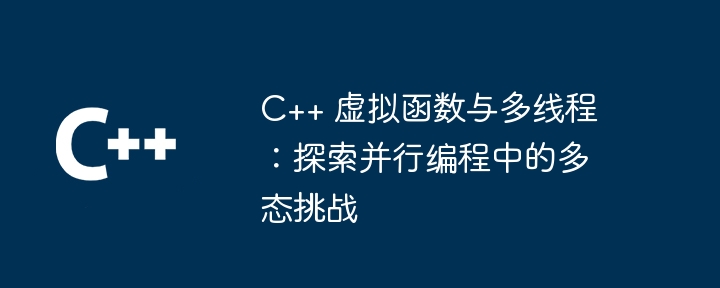
Using virtual functions in a multi-threaded environment may result in race conditions, data corruption, or undefined behavior. Solution: 1. Use mutex locks to protect shared resources. 2. Each thread acquires a mutex lock before calling the virtual function to ensure concurrency safety.

C Virtual functions and multithreading: Uncovering the polymorphic fog in concurrency
Foreword:
Virtual functions in C are powerful tools for achieving polymorphism, but there are some challenges when using virtual functions in a multi-threaded environment. This article takes a deep dive into the interaction between virtual functions and multithreading, and uses practical examples to demonstrate how to address these challenges.
Virtual function overview:
Virtual function is a function feature in C that allows parent and subclasses to have different implementations of methods with the same name. When a virtual function is called, the compiler determines which implementation to call based on the runtime type of the object.
Concurrency issues in multi-threading:
Concurrent programming involves multiple threads executing the same code segment at the same time. A race condition results when these threads simultaneously access shared resources, such as methods implemented by virtual functions.
Practical case:
Consider the following example code:
class Base {
public:
virtual int compute() = 0;
};
class Derived : public Base {
public:
int compute() override { return 42; }
};
int main() {
Base* base = new Derived;
std::thread t1([base] { base->compute(); });
std::thread t2([base] { base->compute(); });
t1.join();
t2.join();
return 0;
}In this example, both threads call the same virtual function compute() , may cause two threads to use the underlying data at the same time. This may result in data corruption or undefined behavior.
Solution:
One way to solve this problem is to use a mutex to protect the shared resource.
std::mutex mutex;
class Base {
public:
virtual int compute() = 0;
};
class Derived : public Base {
public:
int compute() override {
std::lock_guard<std::mutex> lock(mutex);
return 42;
}
};Now, both threads must acquire the mutex before calling the compute() function, thus avoiding race conditions.
Conclusion:
Using virtual functions in a multi-threaded environment requires care to avoid concurrency issues. By using mutex locks or other synchronization mechanisms, you can ensure that shared resources are protected and undefined behavior is avoided.
The above is the detailed content of C++ Virtual Functions and Multithreading: Exploring the Polymorphic Challenges in Parallel Programming. For more information, please follow other related articles on the PHP Chinese website!
 What are the differences between c++ and c language
What are the differences between c++ and c language
 Recommended learning order for c++ and python
Recommended learning order for c++ and python
 Cost-effectiveness analysis of learning python and c++
Cost-effectiveness analysis of learning python and c++
 Is c language the same as c++?
Is c language the same as c++?
 Which is better to learn first, c language or c++?
Which is better to learn first, c language or c++?
 The difference and connection between c language and c++
The difference and connection between c language and c++
 C++ software Chinese change tutorial
C++ software Chinese change tutorial
 Cost-effectiveness analysis of learning python, java and c++
Cost-effectiveness analysis of learning python, java and c++




